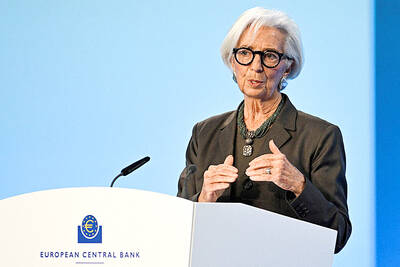China-centric online casinos vacated half of their offices in the Philippine capital during the COVID-19 pandemic, as travel restrictions, taxes and precarious relations between the two countries throttled their operations.
They occupied 677,000m2 of Metro Manila office space in the fourth quarter of last year, down from 1.3 million square meters at the start of 2020, Colliers International said.
Some online gaming operators left because of travel restrictions, new taxes and uncertainty over Philippine-China relations as the Southeast Asian nation is set to elect a new president in May, Dom Fredrick Andaya, senior director at Colliers in Manila, said in a briefing yesterday.
Before the pandemic, the US$8 billion industry and its tens of thousands of migrant workers boosted property prices across Metro Manila and its surrounds. Operators employ mostly Chinese to answer queries and process payments for clients who place bets on livestreamed games of baccarat and fan-tan.
Andaya said 18.9 percent of Manila’s workspace might end up vacant this year and the next, as nearly 1.5 million square meters of office space would be added through next year.
Vacancy might ease should online casinos return and add to demand from outsourcing companies, he said.
COVID-19 infections in the Philippines could fall as abruptly as they rose.
After an exponential rise in infections gripped Manila last month, the daily case count has fallen significantly, as the number of tests also fell.
As travel restrictions ease, “it’s really up to Philippine-China relations, with respect to the level of tolerance in allowing the industry to prosper,” Andaya said.

European Central Bank (ECB) President Christine Lagarde is expected to step down from her role before her eight-year term ends in October next year, the Financial Times reported. Lagarde wants to leave before the French presidential election in April next year, which would allow French President Emmanuel Macron and German Chancellor Friedrich Merz to find her replacement together, the report said, citing an unidentified person familiar with her thoughts on the matter. It is not clear yet when she might exit, the report said. “President Lagarde is totally focused on her mission and has not taken any decision regarding the end of

French President Emmanuel Macron told a global artificial intelligence (AI) summit in India yesterday he was determined to ensure safe oversight of the fast-evolving technology. The EU has led the way for global regulation with its Artificial Intelligence Act, which was adopted in 2024 and is coming into force in phases. “We are determined to continue to shape the rules of the game... with our allies such as India,” Macron said in New Delhi. “Europe is not blindly focused on regulation — Europe is a space for innovation and investment, but it is a safe space.” The AI Impact Summit is the fourth

CONFUSION: Taiwan, Japan and other big exporters are cautiously monitoring the situation, while analysts said more Trump responses ate likely after his loss in court US trading partners in Asia started weighing fresh uncertainties yesterday after President Donald Trump vowed to impose a new tariff on imports, hours after the Supreme Court struck down many of the sweeping levies he used to launch a global trade war. The court’s ruling invalidated a number of tariffs that the Trump administration had imposed on Asian export powerhouses from China and South Korea to Japan and Taiwan, the world’s largest chip maker and a key player in tech supply chains. Within hours, Trump said he would impose a new 10 percent duty on US imports from all countries starting on

STRATEGIC ALLIANCE: The initiative is aimed at protecting semiconductor supply chain resilience to reduce dependence on China-dominated manufacturing hubs India yesterday joined a US-led initiative to strengthen technology cooperation among strategic allies in a move that underscores the nations’ warming ties after a brief strain over New Delhi’s unabated purchase of discounted Russian oil. The decision aligns India closely with Washington’s efforts to build secure supply chains for semiconductors, advanced manufacturing and critical technologies at a time when geopolitical competition with China is intensifying. It also signals a reset in relations following friction over energy trade and tariffs. Nations that have joined the Pax Silica framework include Japan, South Korea, the UK and Israel. “Pax Silica will be a group of nations